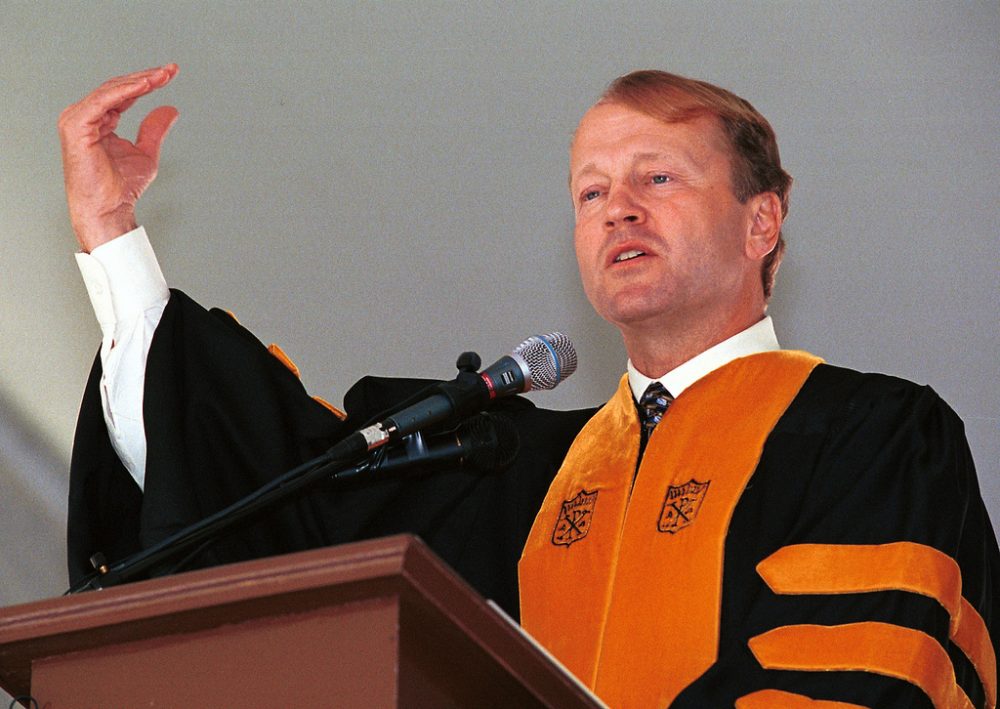2000: Speaker John Chambers
Chambers tells WFU grads they will be part of a second industrial revolution
By Kimberly G. Gentry
May 15, 2000

John Chambers, president and CEO of the worldwide Internet leader Cisco Systems, said today during Wake Forest University’s commencement ceremony that technology is driving a second industrial revolution.
“The first industrial revolution brought together people and machines and factories. It forever changed the have and have not companies, countries and individuals,” Chambers told a crowd of nearly 10,000 people attending the university’s outdoor commencement ceremony.
“The second industrial revolution will have every bit as much impact. It will bring people together in virtual organizations or companies on a global basis,” Chambers continued. “It will determine which countries, which individuals, which companies prosper in life.”
Chambers was awarded an honorary doctor of laws during the event. His daughter, Lindsay, was among the 795 Wake Forest students receiving bachelor’s degrees. The university also awarded 598 graduate and professional degrees.
Chambers recognized Wake Forest’s graduates as being especially prepared for a rapidly changing world heavily influenced by technology.
“You are a generation of firsts in so many ways. You’re the first generation to graduate in the new century, but you’re the first really networked class, a class that understands – just like in the Industrial Revolution – what this new technology means to your future.”
Wake Forest’s undergraduate Class of 2000 entered Wake Forest in fall 1996 as it launched a technology initiative that provided laptop computers to all undergraduates, wired buildings across campus for Internet access, and provided new opportunities for teaching with technology. Wake Forest became a national model for its use of technology and ranks among the most wired campuses in the country. In recent years, national and international news organizations from The New York Times to the British Broadcasting Corporation have covered the liberal arts university’s adoption of technology to enhance undergraduate education.
“In looking at businesses around the world, only in the last year have they realized that the Internet is going to change everything,” Chambers observed. “They must connect every one of their employees, they must connect all of their suppliers. And, your counterparts around the world are just now beginning to wire their schools.”
“Your administration understood not only was it important to teach people how to learn, but also to open up your ideas and your communications through this networked world,” Chambers added.
The future holds great change, according to Chambers. “This generation will see more change than your prior generations did by a magnitude of many fold.”
“If you think about the changes – from an electronic point of view – that you will see, there will be no such thing as a business that isn’t an e-business. Everything in business, in medicine, in law, even in arts and sciences, will be completely connected,” he said. “You will find that in your home or in your automobile, not only will every electronic device be connected, but there will be one connection coming into your home that does data, voice and video. Everything from your refrigerator to your dishwasher to your piano will be connected.”
Chambers encouraged the graduates to embrace being the “first Internet generation of leaders.”
“Take time to enjoy it because it will change every aspect of your lives from health care to how you do your jobs,” he said.
Chambers also talked about the importance of nurturing the connections to friends and family.
“You’re going to lose many things in life – your keys, your wallet, maybe even your jobs and occasionally your boyfriend or girlfriend,” he said. “But, hang on to your family and friends because they are what life is all about. They will be there in the good times when it’s very easy, but they are most important in the tough times.”
In closing, Chambers told the graduates to enjoy the present.
“As you look forward, the days and years in front of us are still going to be a mystery. Look at each day of your life, but particularly today, as a gift and maybe that’s why we call today a ‘present.’ Use this present to share with your family and friends. Take the time to tell them how much you care about them, how much of a difference they’ve made in your lives up to this point in time and maintain the relationships as you go forward.”
